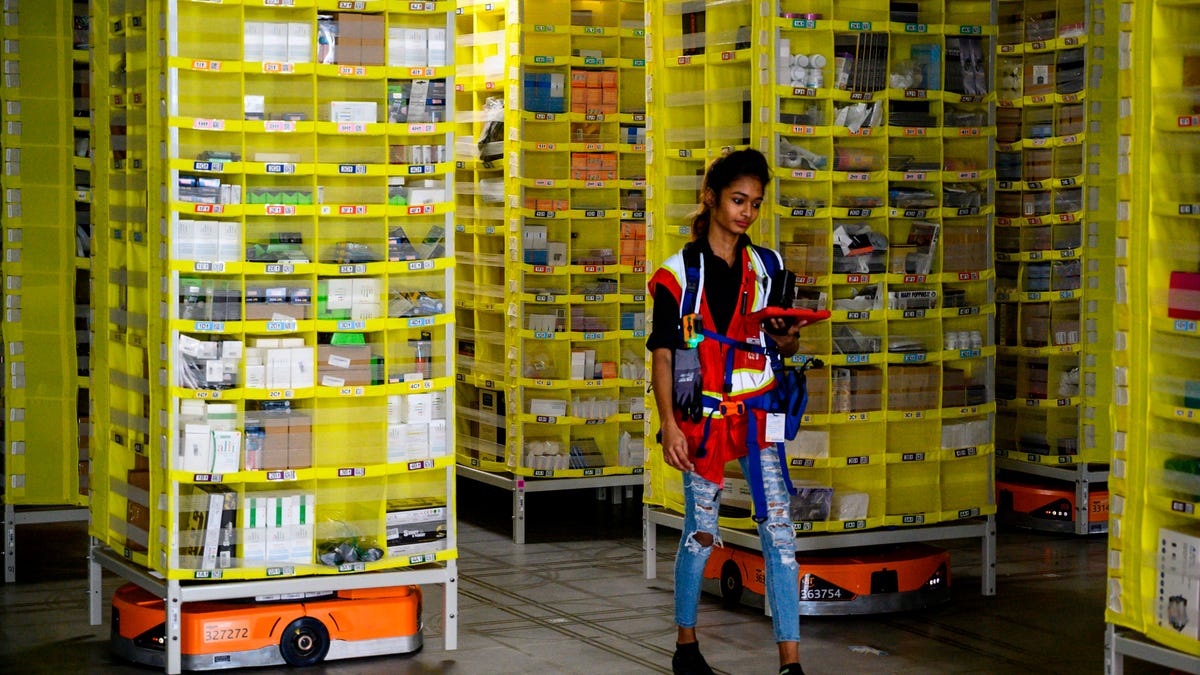Amazon to Face More Labor Organizing After Historic Union Win
A fledgling union beat the e-commerce giant's deep pockets.

One Staten Island, New York, Amazon warehouse has voted to unionize, and another will vote in a union election later this month.
Warehouse workers in Staten Island, New York, voted last week to join the new Amazon Labor Union, a stunning rebuff to the e-commerce giant that will almost assuredly alter the dynamics between employee and employer.
The vote, which was tallied at 2,654 to 2,131, was an expression of employee dissatisfaction with Amazon, where higher wages, health insurance and tuition reimbursement haven't been able to stem a torrent of complaints about its punishing pace of work. The success at the huge facility will likely encourage labor organizers to attempt unionizing other Amazon warehouses across the country.
Already, another Staten Island warehouse is in the throes of a union push. Amazonians United, a workers group, has made direct demands for raises and paid time off on behalf of workers, and a group at a Seattle Amazon Fresh store has declared itself a union and made similar demands of the company.
"This is the first step. It is a historic moment," the Amazon Labor Union said in a statement. "And it is just the first of many."
The steady cadence of labor activity at Amazon underscores the growing power of workers in an economy in which almost no employer can find enough people to work. Two years of pandemic have prompted workers to reevaluate their lives, with many opting to change jobs or retire. The phenomenon has become so widespread that it's known as the Great Resignation.
Amazon said in February it fell short of its goal of hiring 150,000 seasonal workers over the winter holidays and found itself paying high rates of overtime wages to make up for staffing shortfalls. The company attributed the problem in part to the omicron variant of the coronavirus, but also projected increasing labor costs as it works to staff an expanding network of warehouses.
In addition to tempting workers with better benefits, Amazon actively worked to dissuade workers from joining the union, requiring them to attend meetings at which representatives tried to convince them to vote no in their elections. They also sent messages to workers phones and put signs up around the facilities.
The victory marked a reversal from last year, when Amazon workers in Alabama rejected joining the Retail, Wholesale and Department Store Union by a large margin. The company reportedly spent $4.3 million on anti-union consultants that year. It's unclear how much money the company has spent this year.
In trying to prevent unions from taking hold, Amazon has emphasized that union representatives would constitute a barrier to direct worker communication with Amazon managers and executives. Unions, the company has argued, bring in an unneeded third party to the relationship.
Amazon Labor Union was created by current and former workers, and isn't affiliated with larger, established unions. It says it has no plans to turn over its operations to an established union, but does plan to launch nationwide organizing and training soon.
The ALU tossed out the standard union playbook and made mistakes along the way. In a rookie error, the group filed a petition to the National Labor Relations Board, the federal agency charged with running union elections and enforcing labor law, without the required number of signatures. The NLRB rejected the petition.
A second petition met the legal threshold of 30% of workers, but still fell short of the more-than-50% threshold unions typically try to achieve ahead of a vote. Unions try to line up votes in advance with the expectation some workers will change their minds before the vote takes place.
Labor experts estimated that the ALU likely hadn't built up enough support to win the election. But the union organizers reckoned that trying to get 50% would have been a waste of resources because employee turnover is over 100% at Amazon warehouses, says Connor Spence, the ALU's vice president of membership.
"By the time we had those numbers, so many people would have left that we would have been close to 30% anyway," he said. With an election on the books quickly, it was more likely the people who originally supported the union would be around to vote.
Geography may also have contributed to the union's success, says Michael Pachter, an analyst with WedBush. Workers in dense urban areas like Los Angeles, New York and San Francisco have more options for getting well-paying jobs, he says, meaning they're less afraid to push back on working conditions or fear losing their jobs.
"I expect the union wave to spread to those places and other high wage markets," Pachter said.
Workers at another Amazon warehouse in Staten Island will vote at the end of April on whether to join ALU, requiring organizers to campaign all over again. Whether the union represents one warehouse or two, it will have a big challenge in negotiating a contract for workers, says Kirthi Kalyanan, director of the Retail Management Institute at Santa Clara University.
"They have to deliver," he said, "and everyone will be waiting on the sidelines to see how this will evolve."
Having failed to convince enough workers to vote no, Amazon appears poised to take on the federal agency that runs union elections to reverse the outcome. In a statement last week, Amazon said it would consider filing an objection to the election based on what it called the "inappropriate and undue influence" of the NLRB.
The company is questioning an agency order made in the days before the election that required Amazon to reinstate a fired Staten Island warehouse worker who was involved in union organizing.
The NLRB responded by saying its actions have been consistent with its mandate from Congress.

